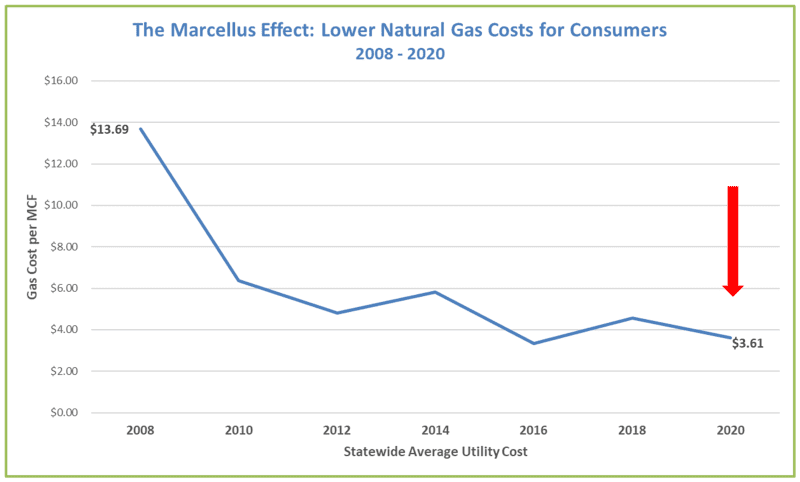Abundant natural gas is our nation’s most strategic asset in helping achieve global energy security, affordability, and environmental advancements.
As some politicians who have consistently opposed domestic energy production scramble to identify short-term solutions to address the current energy crisis, it seems they have forgotten constraints that they themselves have called for or placed on the energy industry that actually hinder its ability to respond. Despite this, America’s energy producers are working diligently to stabilize the market, ease energy supply gaps across the world, and drive both climate and economic progress.
Yet some elected officials continue to peddle misinformation for political gain that we’re holding back production and profiteering at the expense of our allies in Europe. Our industry has wrestled with complicated and unpredictable fiscal and regulatory policies that hinder development and responded to reckless and harmful rhetoric with facts.
Take, for example, the misnomer unconventional operators in Pennsylvania are sitting on up to 40% of issued DEP well drilling permits. An examination of the data reveals DEP has issued 2,998 unconventional well permits in the last 3 years, 37% of which were for either permit modifications or renewals of previously issued permits. This is a clear indication that no operator simply allows an approved well drilling permit to go unused.
Predictable, efficient permit review should be a priority for state government, as it strengthens Pennsylvania’s overall business climate. But in addition to Pennsylvania having the highest permit fees in the nation ($12,500), state regulatory requirements and unpredictability of the regulatory process have hindered the industry’s ability to develop resources once permits are secured.
Representative Jonathan Fritz (R – Wayne) has introduced legislation mandating DEP review of permits within 45 days, as opposed to, in some corners of the state, nearly 200 days that too often is common practice.
“The goal is to make Pennsylvania more attractive to business, more competitive with neighboring states,” Representative Fritz said of the bill last year. “States that, frankly, are ‘eating our lunch’ when it comes to attracting business and economic development.”
MORE: Chronic Permitting Logjam Threatens Energy Investments, Jobs
Appalachia is America’s largest natural gas producing region, but that only goes so far when there’s no means of transporting it. Pipeline constraints hold back production, depress in-basin pricing, and prevent consumer access to the world’s most prolific natural gas area.
But six of the last seven planned interstate pipeline projects to move 6 BCF/day of natural gas to New England and Southeastern U.S. markets have been cancelled or put on hold, a Natural Gas Supply Association analysis calculates.
And this week, the U.S. Energy Information Administration (EIA) released a new report exploring the effects of failing to build more interstate natural gas pipelines, calculating up to an 11% increase in costs while doing little to reduce emissions.
“Significant pipeline projects that have either been shut down by federal action or by private interest, that impacts the ability to get natural gas where it’s needed,” MSC’s Callahan told Fox Business in October. “Those impacts can be seen in higher utility bills.”
Risks to consumers are, in part, what prompted U.S. Sen. Joe Manchin to call for the Defense Production Act to be applied to the regional Mountain Valley Pipeline’s approval to enhance energy access amid Russia’s invasion of Ukraine.
MORE: Increased Pipeline, Export Capacity Solution to Global Energy Crunch
It’s also important to bear in mind that like any global commodity, natural gas does experience price swings influenced by a variety of factors, including political and regulatory environments and supply and demand.
While prices are inching higher, the U.S. shale revolution is the primary reason why U.S. homeowners, small businesses, and manufacturers have realized significant energy savings over the last decade.
In Pennsylvania alone, residential natural gas prices ranged from approximately $12-$25 /mcf in the early 2000s – today’s pricing remains more than half of what it once was.

Inflation, energy security and protecting our shared environment are among Americans’ most glaring concerns – concerns which can be alleviated by unleashing domestic energy, which is done safely, responsibly and under the highest environmental standards in the world. As our nation’s second largest producer of this crucial fuel, Pennsylvanians should be proud of our ability to contribute so much here at home while easing global energy and humanitarian crises.
The proof is in the data itself – to increase access to clean, affordable energy for domestic consumers, while enhancing our national energy security, the answer is critical infrastructure and export capacity so consumers everywhere can realize the benefits of abundant, American-made energy.





